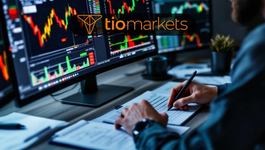Global Stock Market Trading Hours Explained | TIOmarkets
BY TIOmarkets
|June 11, 2024Understanding the intricacies of global stock market trading hours is crucial for traders aiming to maximize their strategies in the international arena. This article delves into the operational hours of major stock markets around the world, highlighting the opportunities and challenges they present.
Introduction to Global Trading Hours
The concept of global trading hours refers to the time frame in which stock markets are open for business across different time zones. This phenomenon allows for almost 24-hour trading, offering unique opportunities for traders.
Grasping the schedule of each major stock market is essential for effective trading, as it influences liquidity, volatility, and the execution of trades.
Major Stock Markets and Their Hours
Each major stock market operates according to its local time and business days, affecting how and when trades can be made internationally.
The New York Stock Exchange (NYSE)
The NYSE is a pivotal platform in the global financial landscape, located in the United States. It operates from 9:30 AM to 4:00 PM Eastern Standard Time (EST), Monday through Friday, excluding public holidays.
This market's hours are crucial for traders worldwide due to its significant impact on global financial movements and the vast array of companies listed.
The London Stock Exchange (LSE)
Positioned in the United Kingdom, the LSE serves as a key hub for European and international trading. Its trading hours are from 8:00 AM to 4:30 PM Greenwich Mean Time (GMT), aligning with London's business hours.
The overlap with the NYSE offers a unique window where liquidity and volatility are heightened, presenting distinct opportunities for traders.
The Tokyo Stock Exchange (TSE)
As Asia's premier stock exchange, the TSE's hours are from 9:00 AM to 3:00 PM Japan Standard Time (JST), with a lunch break from 11:30 AM to 12:30 PM. This schedule reflects the Asian market's trading rhythm.
Understanding the TSE's hours is vital for those looking to engage with the Asian markets, offering insights into the economic indicators that drive the region's financial dynamics.
Understanding Time Zone Overlaps
The global nature of stock trading means that the operational hours of different markets can overlap, creating periods of increased activity and liquidity.
NYSE and LSE Overlap
The overlap between the NYSE and LSE occurs from 8:00 AM to 12:00 PM EST, offering a window of heightened trading activity due to the convergence of American and European traders.
This period is often marked by increased volatility, which can present both opportunities and risks for traders.
Asian and European Overlap
While the overlap between Asian and European markets is limited, the opening hours of the TSE and the closing hours of the LSE can sometimes coincide, affecting trading strategies focused on these regions.
Traders must be aware of these overlaps to optimize their trading strategies, taking advantage of the increased liquidity and potential for significant market movements.
Challenges and Opportunities
Trading across different time zones presents both challenges and opportunities, from navigating the complexities of international market hours to exploiting periods of heightened activity.
Navigating Market Hours
One of the primary challenges traders face is keeping track of various market hours and their overlaps. This requires a comprehensive understanding and strategic planning to ensure effective trading across different time zones.
Utilizing trading platforms that provide real-time information on market hours can significantly aid in this endeavor.
Exploiting Volatility
Periods of market overlap are often characterized by increased volatility, which, while risky, can offer lucrative opportunities for well-prepared traders.
Developing a strategy that takes into account the timing of these overlaps can enable traders to better position themselves to capitalize on market movements.
Conclusion
Understanding global stock market trading hours is fundamental for traders looking to engage in international markets. By mastering the schedules of major stock exchanges and recognizing the significance of market overlaps, traders can enhance their strategies, taking advantage of the opportunities presented by the global trading landscape.
While navigating different time zones and market hours can be challenging, the potential rewards make it a worthwhile endeavor for those willing to invest the time and effort to understand these dynamics.
Impact of Economic Indicators on Trading
Economic indicators play a significant role in influencing trading decisions across global markets. Understanding how key indicators such as GDP growth, inflation rates, and employment figures impact market sentiment is crucial for traders.
For instance, a higher-than-expected GDP growth rate in a country can lead to increased investor confidence, potentially boosting stock prices. Conversely, rising inflation rates may signal economic instability, causing market downturns.
Traders must stay informed about upcoming economic releases and their potential effects on the markets to adjust their strategies accordingly and capitalize on emerging opportunities.
Unemployment Rates and Market Sentiment
The unemployment rate is another critical economic indicator that can sway market sentiment. High unemployment rates may indicate a struggling economy, leading to decreased consumer spending and lower corporate profits.
Conversely, declining unemployment rates often signal economic growth and increased consumer confidence, which can drive stock prices higher. Traders closely monitor unemployment data to gauge the overall health of an economy and make informed trading decisions.
Utilizing Trading Tools for Market Analysis
Traders can leverage a variety of tools and technologies to conduct in-depth market analysis and make informed trading decisions. These tools range from technical indicators to algorithmic trading systems, providing valuable insights into market trends and potential entry/exit points.
Technical analysis tools, such as moving averages and relative strength index (RSI), help traders identify patterns and trends in price movements, aiding in the prediction of future market behavior.
Algorithmic trading systems use complex algorithms to execute trades automatically based on predefined criteria, allowing traders to react quickly to market changes and capitalize on opportunities.
Risk Management Strategies
Effective risk management is essential for traders operating in global markets, where volatility and uncertainty are prevalent. Implementing risk management strategies, such as setting stop-loss orders and diversifying portfolios, can help mitigate potential losses and protect capital.
Traders should establish clear risk tolerance levels and adhere to disciplined trading practices to safeguard their investments against unexpected market fluctuations. By incorporating risk management techniques into their trading strategies, traders can enhance their long-term profitability and sustainability.
Regulatory Considerations in Global Trading
Engaging in global stock market trading requires an understanding of the regulatory frameworks governing financial markets worldwide. Regulatory considerations encompass a wide range of factors, including trading restrictions, reporting requirements, and investor protection measures.
Traders must comply with the regulations of each market they operate in to ensure legal and ethical trading practices. Failure to adhere to regulatory guidelines can result in penalties, fines, or even suspension from trading activities.
Staying informed about regulatory developments and seeking guidance from legal professionals can help traders navigate the complex landscape of global trading regulations and operate within the boundaries of the law.
Start Trading with TIOmarkets
Now that you're equipped with the knowledge of global stock market trading hours, it's time to put that understanding into action. Join over 170,000 traders across 170 countries who have chosen TIOmarkets as their trusted forex broker and online trading platform. With access to over 300 instruments across 5 markets, including Forex, indices, stocks, commodities, and futures, you can trade with low fees and robust support. Enhance your trading skills with our comprehensive educational resources and step-by-step guides. Ready to dive into the world of trading? Create a Trading Account with TIOmarkets today and start your journey towards successful trading.

Risk disclaimer: CFDs are complex instruments and come with a high risk of losing money rapidly due to leverage. You should consider whether you understand how CFDs work and whether you can afford to take the high risk of losing your money. Never deposit more than you are prepared to lose. Professional client’s losses can exceed their deposit. Please see our risk warning policy and seek independent professional advice if you do not fully understand. This information is not directed or intended for distribution to or use by residents of certain countries/jurisdictions including, but not limited to, USA & OFAC. The Company holds the right to alter the aforementioned list of countries at its own discretion.
Join us on social media

Behind every blog post lies the combined experience of the people working at TIOmarkets. We are a team of dedicated industry professionals and financial markets enthusiasts committed to providing you with trading education and financial markets commentary. Our goal is to help empower you with the knowledge you need to trade in the markets effectively.
Related Posts





